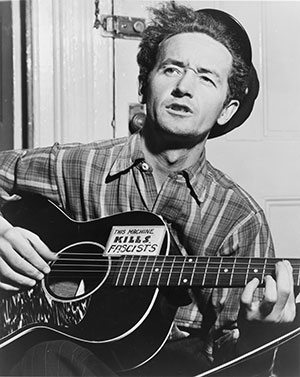
The first college I attended was Antioch College in Yellow Springs, Ohio. It had a work-study curriculum in which half your year was spent working off-campus on some job relating to your professional aspirations. At that time, being interested in the theatre, I was offered and took a job at a Cleveland television station. A few days before the job began it was canceled. I was offered a job at a bookstore, but decided to find a job on my own.
A family friend was Lee Hays, the baritone singer for the popular folk group, The Weavers. Lee also was a mentor to me and my would-be writing career. I don’t recall the circumstances but having learned that I was looking for a job, he sent me to Harold Leventhal, who managed The Weavers. Leventhal offered me a job.
It appeared that Mr. Leventhal was involved in some way with the estate of the late Woody Guthrie. What was the job? Guthrie was not just a famous performer, and a song writer, he was a writer. In 1943, he had published a “partially fictionalized” autobiography. Indeed, he left boxes of manuscripts. What job was I offered? Read through all those boxes and let Mr. Leventhal know if anything was worth publishing. I was next interviewed by Pete Seeger who was also involved in the Guthrie estate.
I got what I thought was a glamorous job. If this seems an odd job to be given to a nineteen-year-old — I would, in retrospect, agree The many boxes arrived.
I held myself to working an eight-hour day.
The problem was that Guthrie had Huntington’s disease, which is “a fatal genetic disorder that causes the progressive breakdown of nerve cells in the brain. It deteriorates a person’s physical and mental abilities during their prime working years and has no cure.”
Thus the Guthrie writing I had to read — from his late years — was at best erratic, and often disturbing. Whatever hero worship I might have had about this vital, hugely creative and important man, rapidly disintegrated. But being the age I was, I doggedly read on, eight hours a day for three months.
When, after the three months were up and I came in to report to Mr. Leventhal, he asked, “Is there anything worth publishing?” To which I replied, “Nothing.”
Why these folks trusted my judgment — or even if they did trust my judgment — I never learned. But I am perhaps one of the few people who — ever since — cannot bear to listen to the distinctive voice of Woody Guthrie. I had gotten too much into his ill mind.
